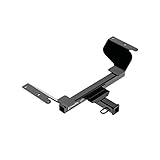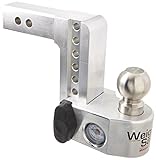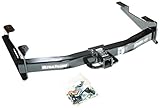Best Trailer Hitch Per Class For 2022
Are you looking for the best trailer hitch to attach to your vehicle? Are trailer hitches essential equipment for your vehicle? Why don’t SUVs and pickup trucks come with it when you buy one?
Towing isn’t as simple as attaching a trailer and driving off. There are a lot of things you need to consider before doing that. You need to know your vehicle’s weight, towing capability, the size of the trailer you intend to pull, and the weight of your cargo. You also have to ensure you have enough stopping power.
Trailer hitches don’t come as a standard feature in modern vehicles. You can treat that information as good or bad. It’s bad because you will have to pay extra for it, it’s good because there are a lot of trailer hitches you can choose from in the market today.
And let’s face it, stock equipment isn’t usually the best in quality for money-saving purposes.
You might as well get a trailer hitch like this from TOPSKY.
We’ve also listed examples of the best products per class for 2020. But before we get to that, let’s learn a few of the most important things you need to know before attaching a trailer to your vehicle.
The Basics On Vehicle Weight Terminology
Ok, let’s get some of the basics vehicle weight terminologies down. These are the important information you need to take note of to ensure that the drive from point A to point B with a trailer behind your vehicle is safe.
Vehicle Weight Terminologies
- Gross Vehicle Weight Rating (GVWR) – The maximum weight your vehicle can handle safely, including the driver, passengers, and cargo. This number is set by the vehicle manufacturer. This information is found on the driver’s side door or owner’s manual.
- Gross Vehicle Weight (GVW) – The actual weight of your vehicle, including the driver, passengers, cargo, and fuel.
- Towing Capacity – This is the maximum weight your vehicle can tow behind it.
- Curb Weight – This is the weight of your vehicle without cargo, passengers, or accessories.
- Gross Trailer Weight Rating (GTWR) – This is the maximum weight your trailer can handle, including the cargo loaded. This is determined by the trailer class set by the manufacturer.
- Gross Trailer Weight (GTW) – this is the actual weight of the trailer plus the cargo loaded.
- Trailer Weight – This is the weight of the trailer when empty.
- Payload Capacity – This is set by the manufacturer, denoting the total weight that the trailer can safely carry.
Classes
Trailer hitches are separated into classes to ensure that they are installed on the right vehicle and used for the appropriate trailers. Some people make the mistake of installing a trailer hitch that is too small or too big for their needs.
Imagine this: a class I trailer hitch on a full-size SUV or a Class IV trailer hitch on a small sedan. In both scenarios, you basically wasted money and the potential to tow something behind your vehicle properly. To avoid making that mistake, refer to the list below and get the right trailer hitch for your vehicle.
Class I Trailer Hitches – Best Trailer Hitch
Class I trailer hitches can handle loads up to 2,000 pounds or a little over 900 kgs.
This type of trailer hitch is best for light duty work, which small cars and crossovers can easily handle.
You can attach a small trailer behind your car and lug a small boat or motorcycle with it. You can also tow a small trailer if you want. Just make sure your brakes can handle the extra weight attached behind your car.
Here are the best examples for Class I:
Related Articles
If you have a bigger car and you want to tow something larger behind it, you might want to consider getting a Class II trailer hitch.
Class II Trailer Hitches – Best Trailer Hitch
Class II trailer hitches can handle loads up to 3,500 pounds or 1,600 kgs.
This type of trailer hitch is best for moderate-duty work for mid-sized sedans. you can also install this on light trucks and mid-sized SUVs. These vehicles are large enough to handle heavier loads with the bigger brake pads they have installed.
Class II trailer hitches are perfect for towing small boats, campers, and snowmobiles. Class II trailer hitches can also be used to tow what Class I trailer hitches can without any issues.
Here are the best examples for Class II:
If you’re planning to tow anything heavier, you’ll need to upgrade to a Class III trailer hitch.
Class III Trailer Hitches – Best Trailer Hitch
Class III trailer hitches can handle loads up to 5,000 pounds or 2,300 kgs.
This type of trailer hitch is best for moderate to light heavy-duty work. This is appropriate for pickups, minivans, and full-size SUVs.
Class III trailer hitches can pull mid-sized boats, campers, and trailers. This is good for lugging around enough cargo for a good weekend on the road. This is also the most popular type of trailer hitch you can find on the road based on its size and practicality.
Here are the best examples for Class III:
Class III trailer hitches can tow what Class II trailer hitches can. You might want to hold off on using it for Class I rated objects as the Class III hitches may be too big for hauling small stuff.
If the Class III tow hitch is still too small, you’ll need a Class IV trailer hitch. Just make sure you have a vehicle that’s big enough for the trailer you’re planning to tow behind it.
Class IV Trailer Hitches – Best Trailer Hitch
Class IV trailer hitches can handle loads up to 10,000 pounds or 4,500 kgs.
This type of trailer hitch is best for moderate to light heavy-duty work. This is appropriate for pickups, minivans, and full-size SUVs. With this trailer hitch, you can easily tow large campers, boats, and small haulers.
Here are the best examples for Class IV:
Class IV trailer hitches can haul what Class I, II, and III trailer hitches can but may be too big for the first two.
If a Class IV isn’t enough, get a Class V.
Class V Trailer Hitches – Best Trailer Hitch
Class V trailer hitches can handle loads up to 17,000 pounds or 7,700 kgs.
This type of tow hitch is best for heavy-duty work. This is appropriate for heavy-duty vehicles like large pickup trucks and commercial trucks. With loads as heavy as this, you need to ensure you have brakes capable of providing the stopping power needed to avoid accidents from happening while in transit.
Although Class V trailer hitches can efficiently handle smaller loads, you might want to just dedicate it to hauling larger loads.
Class V Trailer hitches can handle large, full-size campers, equipment trailers, and the like.
Here are the best examples for Class V:
Class V trailer hitches are the largest you can get for conventional vehicles.
Conclusion
You need to figure out your vehicle’s GVWR to attach the right tow hitch. Knowing the different classes and figuring out where your vehicle belongs is the best way to do that. Always refer to the owner’s manual and calculate the size of your vehicle, trailer, and tow hitch to use.
With the right tow hitches attached, you can ensure maximum safety on the road when you’re traveling with a trailer behind it.
Happy trails!
Related Questions
Are Trailer Hitches Dangerous?
Yes. Trailer hitches are solid pieces of equipment attached to the rear-most portion of your car. This effectively increases your car’s length by at least six inches. Naturally, the larger the tow hitch, the longer your vehicle will end up. This can potentially damage other vehicles on the road if they hit it.
What Happens When You Overload Your Vehicle With Cargo?
Dangerous things can happen to your vehicle when you overload it. You could bottom the shocks out, and this can lead to tire rubbing. The friction between your tires and the wheel wells could lead to a blowout. Braking will also be difficult with too much weight in your car. This can lead to a collision.
Can’t I Just Install A Roof Rack To Increase My Cargo Space?
Installing a roof rack is another way to increase your cargo space effectively. The only difference is the amount of cargo you can bring along. A trailer has more space than a roof rack. You also don’t want to overload your roof rack as that could compromise your car’s integrity.














